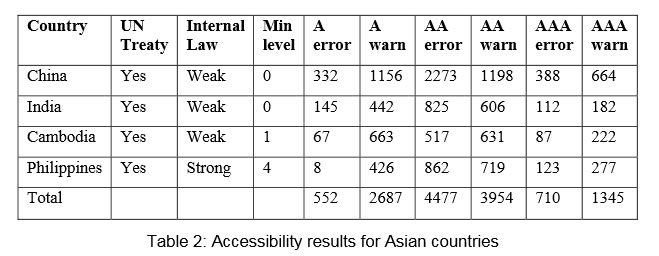The Philippine compliance in terms of web accessibility is considered as the strongest in Asia as revealed by the research conducted by the University of Worcester in United Kingdom.
Entitled, “Global e-government Web Accessibility: An Empirical Examination of EU, Asian and African Sites”, the study cited the Philippines as one of the strongest outlooks among Asian countries of promoting disability access. First, the government both signed and ratified the UN Treaty. Second, the federal law section (RA7277) “the Magna Carta for the Disabled Persons,” specifically prohibits discrimination against disabled persons.
Using appropriate tools in analyzing sites based on Web Content Accessibility Guideline 1.0, the researchers used TAW software product. It tests checkpoint levels A (priority 1), AA (priority 2) and AAA (priority 3). For each of these checkpoints TAW provides a detailed report of both automatic and human review issues. Automatic issues are those errors that the software has checked based on the WCAG guidelines.
The research indicates that
All of the countries have signed and/or ratified the UN Treaty on Rights of Disabled. However, compared to the EU countries, in Asia the only country with a strong internal disability law is the Philippines. The Philippines was the Asian country showing the strongest compliance level for WCAG level A, with four of the sixgovernment sites meeting the checkpoint requirements, and only showing eight overall ‘A’ level errors and 426 warnings.
Although most Asian countries showed poor compliance results and weak laws, the Philippines was an exception. Stronger internal laws correlated with higher compliance of Web accessibility design among their government sites.
Evaluation results show that the vast majority of global government sites do not meet WCAG 1.0 checkpoint standards. Some countries, such as the UK, have their own accessibility laws However, even those countries with internal laws, like the UK, have not totally met minimum requirements. The results show that those countries with stronger internal disabilities laws surpass those with weak or non-existent laws in their compliance levels. For example, all the tested EU countries have strong internal disabilities laws, and the results of this study showed that all EU countries outperformed those from Asia and Africa in compliance at all three WCAG priority levels.
The researchers used the Powerpoint presentation of PWAG President Jojo Esposa during one of his lectures at mini-conferences conducted by the Philippine Web Designers Organization (PWDO) with which he was one of the founding members. The presentation can be downloaded under Web Accessibility Presentations of Resources Page.
You may download the complete research paper here in pdf format.








Comments are closed